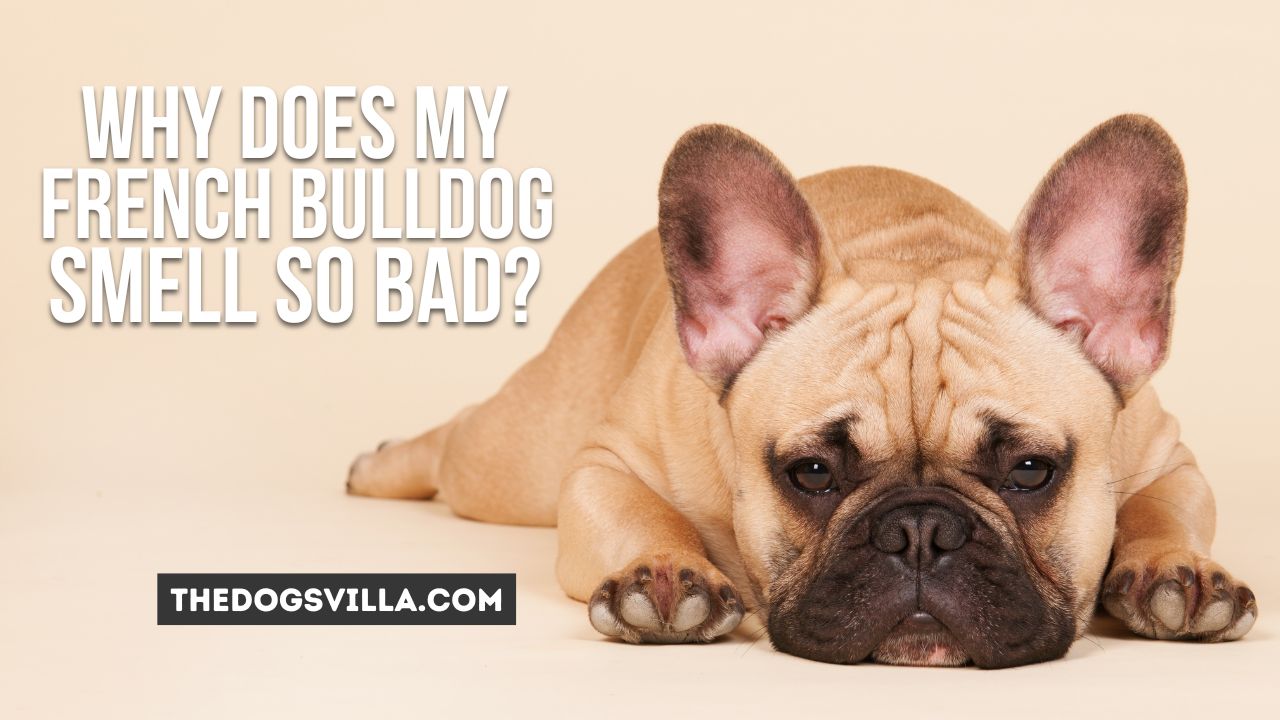French bulldogs are known for being sweet, affectionate, and playful companions. However, many Frenchie owners become frustrated by how bad their dog smells at times. If you’ve ever wondered “why does my French bulldog smell so bad?”, you’re not alone.
This breed is prone to developing a variety of unpleasant odors. In this article, we’ll explore the numerous reasons why French bulldogs often smell so foul, from skin infections to terrible gas. We’ll also provide tips to help you control just how much your Frenchie stinks up the house. Getting to the bottom of why your French bulldog smells so terribly can help you address the root causes.
Contents
- 1 15 Reasons Why Does My French Bulldog Smell So Bad
- 1.1 1. Facial Structure Leads to Excess Moisture and Debris
- 1.2 2. Skin Folds Are Prone to Infection
- 1.3 3. Flatulence from Food Sensitivities
- 1.4 4. Excessive Drooling
- 1.5 5. Ear Infections Are Common
- 1.6 6. Fatty Acid Deficiency
- 1.7 7. Halitosis
- 1.8 8. Diet Causing Odor
- 1.9 9. Paw Chewing and Licking
- 1.10 10. Tiny Debris Trapped in Skin Folds That You Can’t See
- 1.11 11. Accumulation of Shed Fur and Dead Skin Cells
- 1.12 12. Mold or Yeast Overgrowth on Skin
- 1.13 13. Hind End Glands Need Expressing
- 1.14 14. Dental Health Issues
- 1.15 15. Improper Grooming Technique
- 2 Why French Bulldogs Smell More Than Other Dogs
- 3 Common Areas of Smelliness on French Bulldogs
- 4 Methods to Reduce Frenchie Smells
- 5 Conclusion
15 Reasons Why Does My French Bulldog Smell So Bad
1. Facial Structure Leads to Excess Moisture and Debris
French bulldogs have very compact skulls and short snouts which limits airflow. This allows moisture to accumulate around all the wrinkles on their smushed faces, leading to bacteria and yeast overgrowth that causes odor.
2. Skin Folds Are Prone to Infection
The folds of skin on a Frenchie’s face and body can easily harbor moisture, skin oils, and debris. This leads to infected skin folds that give off a yeasty or cheesy smell.
3. Flatulence from Food Sensitivities
Food ingredients like dairy, chicken, grains, and soy are common triggers for tummy trouble in French bulldogs. This can cause very smelly gas and farts.
4. Excessive Drooling
Pooled saliva in skin folds or moisture on any part of the skin can cause odor. Skin dampness leads to microbial overgrowth.
5. Ear Infections Are Common
French bulldogs‘ big bat ears can easily get infected. Infected ear canals smell incredibly foul.
6. Fatty Acid Deficiency
Lack of Omega-3 and Omega-6 fatty acids in Frenchies can lead to dry, itchy and infected skin which smells bad.
7. Halitosis
Gum disease, oral tumors, cracked teeth, or stomach issues can cause stinky dog breath.
8. Diet Causing Odor
Low quality or allergy triggering ingredients lead to gut issues, skin problems, infections and more —- all contributing to bad smells.
9. Paw Chewing and Licking
Itchy paws from environmental allergies or dampness leads to yeasty smelling feet.
10. Tiny Debris Trapped in Skin Folds That You Can’t See
Even after cleaning wrinkles, hidden gunk causes odor.
11. Accumulation of Shed Fur and Dead Skin Cells
Lack of thorough brushing lets this debris accumulate on skin and emit smell.
12. Mold or Yeast Overgrowth on Skin
This can happen if folds and wrinkles don’t completely dry out after baths or if moisture gets trapped under fatty skin rolls.
13. Hind End Glands Need Expressing
These anal glands can get blocked and overflow onto the skin, becoming incredibly stinky.
14. Dental Health Issues
Tartar buildup, decay under the gums or infected teeth all smell pretty funky.
15. Improper Grooming Technique
Not fully drying the skin or using harsh shampoos can worsen smells.
The good news is that staying on top of cleaning routines, grooming, and health checkups can help control odor in French bulldogs prone to smelliness. Work closely with your vet and groomer to develop a good protocol for your stinky Frenchie!
Why French Bulldogs Smell More Than Other Dogs
French bulldogs have several physiological and grooming factors that make them prone to smelly issues:
Facial Fold Dermatitis
One of the most common causes of odor in French bulldogs is skin fold infections in their face, known as facial fold dermatitis. Frenchies have lots of loose skin on their face that can trap moisture, dirt, and debris. This provides an environment for yeast and bacteria to multiply, causing itchiness, redness, and a foul smell.
Fat Folds
French bulldogs also have rolls or fat folds along their body and tail area. Just like the facial folds, these areas can easily become damp and infected. The bacteria and yeast buildup in the fat folds will cause unpleasant odors.
Flatulence
Unfortunately, Frenchies are also commonly gassy dogs! Their short snouts and gastrointestinal issues predispose them to increased flatulence. All those toots lead to some unpleasant smells frequently wafting from their rear end.
Ear Infections
The curly cue ears of French bulldogs also provide the perfect environment for bacterial and fungal infections to develop. These chronic ear infections can cause a strong yeasty smell from your Frenchie’s ears.
Low Grooming
Lastly, Frenchies don’t shed much which also means they don’t release dead hair and skin cells at a high rate. If you don’t regularly brush and bathe them, the buildup of oil and dead cells on their skin can cause odor over time. Proper grooming is essential!
Common Areas of Smelliness on French Bulldogs
Now that we know why Frenchies develop more smell than other breeds, where exactly should you be checking for odors on your dog? Here are the top smelly spots to sniff out:
Facial Folds
Carefully lift your Frenchie’s lips and nose rolls to check for accumulated gunk, moisture, and infections. Red, irritated skin and a strong smell indicates facial fold dermatitis.
Fat Rolls
Run your hands along their body, especially in their armpit region, groin, and tail area feeling for dampness between their fat rolls. Damp, smelly folds need to be cleaned and thoroughly dried to prevent recurring infections.
Butt Area
Of course, their rear needs to be checked! Excess debris, dampness from incontinence issues, and impacted anal glands can all lead to rear-end smells. Also pay attention for increased flatulence.
Ears
Gently sniff inside their ears. A yeasty, funky smell likely indicates an ear infection that needs veterinary treatment. Make sure you don’t confuse normal clean ear smell with an infected smell.
Skin and Coat
Finally, run your fingers through their coat and smell. If there is a strong “doggy” smell, they likely need a good bath and brushing to remove built-up oil and dead skin cells.
Paying attention to these common areas prone to infection and build up will allow quick identification of smell causes.
Methods to Reduce Frenchie Smells
Now that we better understand the source of French bulldog odors, here are some tips to reduce smells and keep your Frenchie fresh!
Set a Grooming Schedule
Regular grooming is key for smell management. Aim to brush them 1-2 times per week and bathe every 3-6 weeks depending on skin sensitivity. Proper grooming will greatly reduce odor issues down the line.
| Grooming Task | Frequency |
|---|---|
| Brushing | 1-2 times per week |
| Bathing | Every 3-6 weeks |
| Nail trimming | Every 2-4 weeks |
| Face fold cleaning | 2-3 times per week |
| Fat fold cleaning | 1-2 times per week |
Clean Face and Body Folds
Use grooming wipes or gentle soap and water to clean skin folds as recommended above. Thoroughly dry areas after cleaning. This prevents bacteria and yeast overgrowth leading to infection and smells.
Bath With Antimicrobial Wash
Using a chlorhexidine or benzoyl peroxide body wash can help reduce stinky skin infections between baths. These antimicrobials reduce bacteria and yeast levels on the skin.
Manage Flatulence
If your Frenchie seems excessively gassy, talk to your vet. Diet change, increased exercise, probiotics, or gas medication may help manage flatulence! Reducing their toots will create a less smelly home.
Identify and Treat Infections
If you find reoccurring body fold infections, ear infections, anal gland issues, or skin diseases, make an appointment with your veterinarian. Treating the underlying condition will be key to stopping smelly symptoms. Your vet can also show you the best at home cleaning methods for chronic issues.
Freshen Between Baths
Use gentle doggy wipe downs, dry shampoo, or deodorizing sprays in between full baths to keep them smelling cleaner. Focus on body folds, feet, and the rear end where smells accumulate quickly.
Keeping up with an appropriate grooming routine tailored to your French bulldog’s needs is crucial to limiting odor!
Frequently Asked Questions
Why does my French bulldog puppy smell more than adult French bulldogs?
French bulldog puppies are still learning grooming behaviors from their mothers. As they explore their environment, they can accumulate more dirt and debris on their skin and coat leading to increased “puppy odor”. Make sure to teach good grooming habits like allowing handling and brushing from a young age. Clean any skin folds thoroughly after outdoor play. Most puppies outgrow strong odors as their mature and cleaning habits improve.
How often should you bathe a French bulldog?
In general, French bulldogs only need bathing every 3 to 6 weeks. Their skin can become dry and irritated with over-bathing leading to more infections. But, if your Frenchie rolls in something stinky or develops recurrent skin fold infections, more frequent baths with an appropriate shampoo may be needed. Discuss any chronic odor issues with your veterinarian to develop the best personalized bathing schedule.
What is the best shampoo for smelly and sensitive French bulldog skin?
Choosing a gentle, soap-free shampoo made specifically for dogs is essential for French bulldogs prone to skin issues. Oatmeal, aloe vera, honey, and shea butter shampoos are great for sensitive skin that needs frequent washing. Also use lukewarm water to prevent drying out their skin further. For dogs with recurring skin infections, antimicrobial shampoos can help reduce infection-causing bacteria and yeast. Discuss chronic skin issues with your vet to choose medicated bathing options if over-the-counter shampoos aren’t solving the problem.
How do I get rid of skin fold odor on a French bulldog?
The key to reducing odor from facial and body folds is keeping the areas clean and dry. Use doggy wipes or a soft, damp cloth to gently remove debris from deep folds. Carefully dry the creases with a towel afterwards. Allowing moisture to fester leads to infections. If redness, irritation or smell returns quickly, you may need antimicrobial wipes or rinses prescribed by your vet to fully eliminate bacteria or yeast embedded deep in the folds. Keeping folds clean is a lifelong process for wrinkly Frenchies!
Conclusion
While their adorably smooshed faces give them tons of charm, French bulldog skin folds are also prone to retaining moisture, oil and dirt leading to infections and odor. Common causes of smelliness include facial fold and skin infections, gas, oily skin, and ear infections. To keep your Frenchie fresher between baths, be diligent about cleaning face and body folds, brushing and expressing anal glands as needed. Setting up a routine tailored to your Frenchie’s specific needs is key to preventing odors.
If smells persist despite good hygiene, make sure to follow up with your vet to diagnose and manage any underlying issues. With a little diligent care of their special skin folds, you can get the occasional unpleasant aroma under control and keep your Frenchie’s signature scent as just a light essence of irresistible pup.

